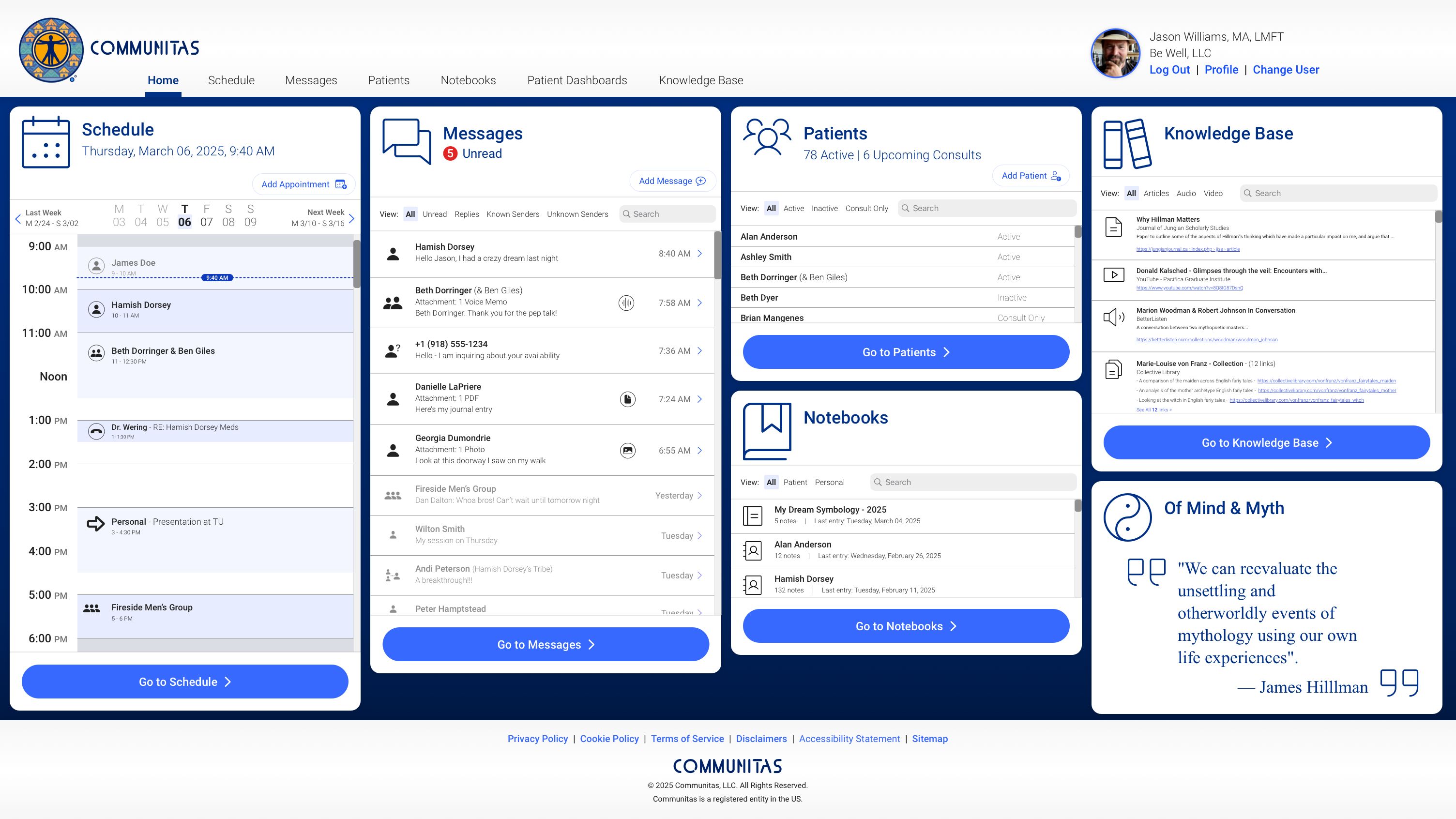Communitas | Psychological Wellbeing Platform
Overview
Communitas is an AI-augmented digital operating system—currently in development—designed to restore the scalability and impact of modern psychotherapy. It centralizes the therapeutic process and serves as a continuous companion for both patients and therapists. It is currently going through funding rounds.
- Bridging the Inter-Session Gap: Communitas addresses the critical lack of continuity between therapy sessions by providing a secure, always-on digital environment for reflection and engagement.
- Hybrid Model for Mental Health Engagement: The platform blends social media-style interaction with clinical-grade features (similar to "MyChart") to create a HIPAA-compliant, intuitive experience that encourages sustained use without compromising safety or privacy.
- Scalable + AI-Powered: Built on secure cloud infrastructure, Communitas uses proprietary AI to surface individualized insights, detect patterns in behavior and mood, and recommend personalized care pathways.
- Designed for a Rapidly Expanding Market: By targeting the inefficiencies in how mental health care is delivered at scale, Communitas unlocks meaningful value for patients, therapists, and investors in the multi-billion dollar digital health sector.
Understanding Therapists
To ground our concept for the platform in real clinical needs, we began with a structured research process focused on therapists' workflows, challenges, and aspirations.
- Initial Product Brief: We started with a high-level concept brief that framed Communitas as a category-defining solution, providing a clear prompt for therapist feedback.
- Interview Design: We built a formal interview template to ensure consistency across research sessions, regardless of who conducted them. This structure helped ensure coverage of key topics while allowing space for unstructured insight.
- Field Interviews: We conducted 40-minute, in-person interviews with practicing therapists, preferably in their office settings, to gather contextual, ethnographic insights. Follow-up forms and qualitative surveys were sent post-session to capture extended feedback.
- Advisory Council: We recruited a small advisory council of therapists to provide early-stage design critique and long-term developmental guidance. We meet regularly to review prototypes and validate emerging features.
- Rapid Iterative Prototyping: Feedback from therapists was immediately mapped to business priorities and translated into initial prototypes. Now we're iterating. We share working concepts online and gather feedback from our advisory group. We're using those insights to refine our designs in real-time.

A preliminary dashboard concept focused on therapist-facing tools for tracking and ongoing engagement.

A patient-facing prototype designed for mobile-first engagement, optimized for simplicity, emotional resonance, and continuous support.
Listening to Patients
Following a research approach similar to the one used with our therapists, we conducted direct interviews with patients currently in therapy to validate needs, expectations, and latent desires.
- Mobile-First Discovery: Patient feedback quickly confirmed mobile devices as their preferred interface, guiding our decision to begin prototyping from a mobile-first standpoint.
- Interview Protocol: Participants were recruited based on active therapy participation. We developed a structured interview script and mirrored our post-session approach used with therapists—collecting both direct feedback and post-interview reflection.
- Key Findings: As expected, patients prioritized features like therapist messaging and appointment reminders. However, several unexpected themes emerged—particularly around the relationship between mental health, movement, and physical wellbeing.
- Fitness Integration Insight: This finding led to API integrations with wellness platforms, allowing our AI to surface correlations between physical activity and psychological states—enhancing insights for both patients and therapists.